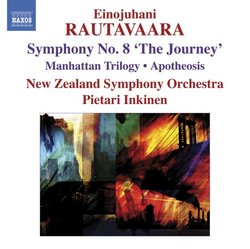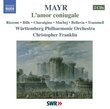| All Artists: E. Rautavaara, Pietari Inkinen, New Zealand Symphony Orchestra Title: Rautavaara: Symphony No. 8 - The Journey; Manhattan Trilogy; Apotheosis Members Wishing: 0 Total Copies: 0 Label: Naxos Original Release Date: 1/1/2008 Re-Release Date: 3/25/2008 Genre: Classical Styles: Historical Periods, Modern, 20th, & 21st Century, Symphonies Number of Discs: 1 SwapaCD Credits: 1 UPC: 747313006977 |
Search - E. Rautavaara, Pietari Inkinen, New Zealand Symphony Orchestra :: Rautavaara: Symphony No. 8 - The Journey; Manhattan Trilogy; Apotheosis
 | E. Rautavaara, Pietari Inkinen, New Zealand Symphony Orchestra Rautavaara: Symphony No. 8 - The Journey; Manhattan Trilogy; Apotheosis Genre: Classical
|
Larger Image |
CD DetailsSimilar CDs |
CD ReviewsImpassioned Modernism Dean R. Brierly | Studio City, CA | 03/31/2008 (5 out of 5 stars) "Einojuhani Rautavaara is a Finnish composer of increasingly celebrated reputation, whose early experimentation with musical forms, including serialism, has for the most part given way to a more tonal and accessible direction. Like many of today's more popular modern composers, there is a strong mystical component to his work. He frequently and evocatively combines strings and woodwinds to bring his austerely beautiful melodies to life. The three pieces on this disc are representative of his current musical inclinations and serve as an excellent introduction to his aesthetic. They're all orchestral works, yet they possess a chamber music-like intimacy. Rautavaara never hits you over the head with the power of the orchestra, but always harnesses it for greater emotional effect. Apotheosis, a reworking of the fourth movement of the composer's Sixth Symphony, is a lush piece for strings and woodwinds that conjures an idyllic, pastoral atmosphere. The melodic line is warm and flowing, like a river of sound that slowly and elegantly builds in intensity before breaking into a brassy, joyful crescendo. Manhattan Trilogy is a relatively short suite keyed to the city's rhythms and textures. The first movement, titled "Daydreams," is built upon a meandering, elegiac theme that gradually takes on overtones of anticipation and suspense. Strings and woodwinds voice the emotional message, buttressed by gently percussive piano. A series of urgent climaxes at the midpoint briefly heighten the intensity before the pastoral mood reaffirms itself. "Nightmares" lives up to its title, as it creates a much heavier, darker mood through swirling, nervous stings and ominous percussion. The dissonant trajectories Rautavaara unleashes here effectively suggest the shadowy side of the city. It's almost like a 1940s film noir score--Bernard Herrmann crossed with Miklos Rosza, perhaps. "Dawn" is not as starkly dramatic, but a sense of unease nevertheless infects the music's trajectory. The strings take on a restless, brooding character, and the overall texture assumes a harder edge. Swelling percussion helps guide the piece to a serene if slightly unsettling resolution. Rautavaara's four-movement Eighth Symphony is another tightly choreographed work that seduces the listener with darkly beautiful themes, easygoing tempos and lush sonorities. It's a very internal, personal work that speaks more to spiritual than temporal concerns. With the exception of the brief second movement, with its percussive agitation and dissonant tonalities, the symphony unfolds at an unvaryingly tranquil pace that avoids monotony through the vibrancy and beauty of Rautavaara's melodic conception." Enriching David Saemann | 11/24/2008 (4 out of 5 stars) "I have been collecting Rautavaara's music in their Naxos releases. Previously I have bought the 7th Symphony, a wonderful experience, and two of the thornier piano concertos. This current CD was an excellent supplement to what I've learned already. Apotheosis is a lyrical work with a degree of heart on the sleeve sentiment. The Manhattan Trilogy, based on the composer's time at Julliard in the 50's, evokes the N.Y.C. of that era intimately. The central Nightmares movement is an effective contrast to the more consoling outer movements of Daydreams and Dawn. In sum, this work is a highly effective contrast of mood paintings. As for The Journey, it is a symphonic statement of grandeur and heart. Compared to the previous works, the orchestral language is more massive, elevated, and large scaled in its dramatic resolution. The piece carries you along with it, drawing you in from the very beginning. The performances and sound engineering on this CD are highly satisfactory, and the orchestral playing seems to be strikingly idiomatic. I only have witheld a fifth star because I don't think the orchestra plays with as much refinement and excitement for Pietari Inkinen as it did for its previous music director, James Judd. This was a bit surprising, since Inkinen's New Zealand recording of Sibelius's Scenes Historiques for Naxos is excellent. Maybe I will warm up to him with repeated hearings of this Rautavaara CD."
|

 Track Listings (8) - Disc #1
Track Listings (8) - Disc #1

![Franz Schmidt: Das Buch mit sieben Siegeln [Hybrid SACD]](https://nationalbookswap.com/cd//m/29/0929/6170929.jpg)
